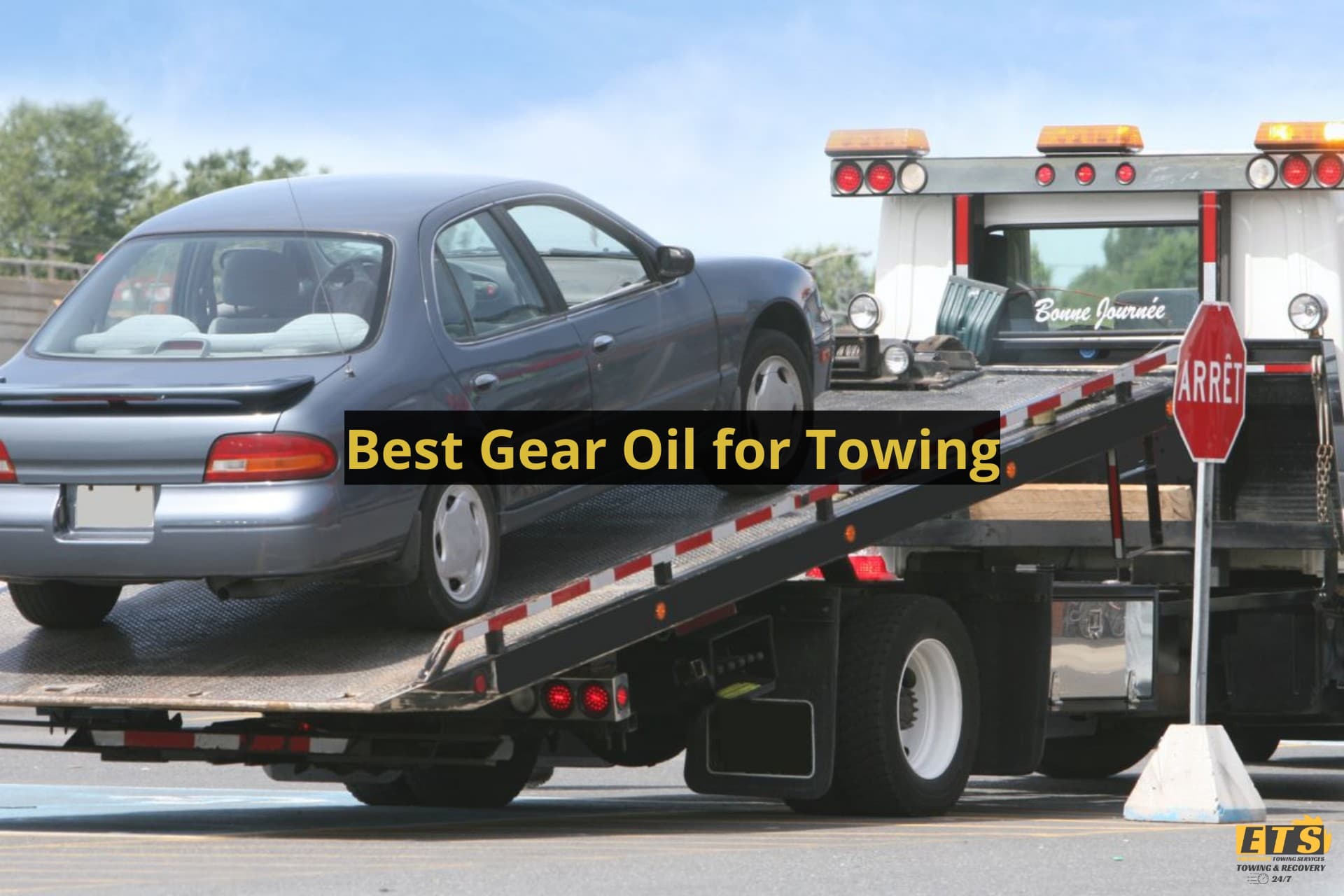Best Gear Oil For Towing
The information presented in this article is provided for general informational purposes only, and may not reflect the current laws or legal developments. This article does not constitute legal advice, and the reader should not act on the information contained in this article without first seeking professional counsel. We make no guarantees about the accuracy, completeness, or adequacy of the information contained in this article. The reader assumes all risks and liabilities associated with any actions taken as a result of reading this article. To obtain legal advice on your specific matter, please contact a qualified legal professional.
Are you planning on towing heavy loads with your vehicle? If so, it’s crucial to ensure that your gear oil can handle the strain. The right gear oil can prevent damage to your transmission and ensure smooth operation while hauling heavy loads.
Choosing the best gear oil for towing can be overwhelming, with numerous options available on the market. Factors such as viscosity ratings and additives must be considered before making a purchase.
In this article, we’ll guide you through everything you need to know about selecting the best gear oil for towing, including top product recommendations and tips for maintenance and care.
Understanding the Importance of Gear Oil for Towing
Understanding why the right lubricant is crucial when towing can prevent costly breakdowns on the road. The gear oil plays a critical role in ensuring that your engine runs smoothly, and it’s essential to choose one that suits your specific needs.
There are different types of gear oils available, including synthetic and conventional. Synthetic gear oil offers better performance than conventional, making it an excellent choice for towing. If you’re using old or worn-out gear oil to tow heavy loads, you risk damaging your engine components and reducing its lifespan.
Conventional gear oils break down faster than synthetics under extreme pressure and high temperatures, which makes them less suitable for towing purposes. On the other hand, synthetic gear oil has superior wear protection properties and lasts longer than conventional oils.
When choosing the best gear oil for off-road towing or hot weather conditions, consider factors such as viscosity ratings and additives used to enhance performance. For instance, some oils have friction modifiers that reduce wear on gears while others contain anti-foaming agents that help prevent air bubbles from forming in the lubricant.
It’s also important to choose a thicker viscosity rating if you’re towing heavier loads or operating in hotter climates. By selecting the right type of gear oil for your vehicle’s needs, you can ensure optimal performance and reliability when towing.
Don’t overlook this vital component; instead, invest in quality lubricants that will protect your engine against damage and extend its lifespan without breaking the bank!
Types of Gear Oil
This section breaks down the different types of gear lubricants available, so you can choose the one that fits your needs like a glove.
There are two main types of gear oil: synthetic and conventional. Synthetic gear oils are made from chemical compounds that have been engineered to provide superior performance, while conventional gear oils are made from crude oil or other natural sources.
When it comes to towing, synthetic gear oil is often the better choice. This is because it contains special additives that help reduce friction and wear on gears under heavy load conditions. These additives also increase the oil’s resistance to breakdown at high temperatures, which is crucial if you’ll be towing in hot weather.
However, if you’re on a budget or don’t plan on towing frequently, conventional gear oil may suffice. Just make sure to choose one with the correct viscosity rating for your vehicle’s transmission and differential.
Ultimately, whether you choose synthetic or conventional gear oil will depend on your individual needs and preferences as a tow driver.
Viscosity Ratings
Choosing the right viscosity rating for your vehicle’s transmission and differential is crucial to ensure optimal performance and protection. When it comes to gear oil grades, there are two main types: multi-grade and single-grade.
Multi-grade oils have a wider range of temperature tolerance, making them suitable for year-round use in varying weather conditions. Single-grade oils, on the other hand, are better suited for specific temperature ranges.
Performance characteristics also play a role in selecting the appropriate viscosity rating. Thicker oil may provide better protection under extreme loads or high temperatures, but it can also cause increased drag and decreased fuel efficiency. Thinner oil may improve fuel economy but could sacrifice some level of protection.
It’s important to strike a balance between performance needs and practical considerations when choosing a viscosity rating. Ultimately, consulting your owner’s manual or speaking with a trusted mechanic can help you determine which gear oil grade is best suited for your towing needs.
Don’t overlook this important aspect of vehicle maintenance – choosing the right viscosity rating can make all the difference in ensuring smooth operation and longevity of your transmission and differential components.
Additives
To get the most out of your vehicle’s transmission and differential, you’ll want to make sure that certain additives are present in your gear lubricant. Additive benefits include reducing friction and wear, protecting against rust and corrosion, improving seal performance, and enhancing thermal stability.
Without these additives, your gear oil will break down more quickly, leading to costly repairs or even complete failure. On the other hand, there are some harmful additives you should avoid when choosing a gear oil for towing. Chlorinated paraffins, leaded additives, and sulfur-based compounds can all cause damage to your transmission or differential over time.
Additionally, some aftermarket products may contain dangerous solvents that can contaminate your engine oil or other fluids. When selecting a gear oil for towing purposes, look for one that includes high-quality anti-wear agents like zinc dialkyldithiophosphate (ZDDP) or molybdenum disulfide (MoS2).
These substances create a protective film on metal surfaces that helps prevent scuffing and galling under heavy loads. You may also want to consider using synthetic gear oils rather than conventional mineral oils since they offer improved resistance to heat and oxidation.
By choosing the right additives for your gear lubricant, you can help ensure smooth operation of your vehicle’s drivetrain while minimizing wear and tear on critical components.
Top Gear Oils for Towing
You need a gear lubricant that can handle the heavy loads of towing, so make sure to check out these top-rated options to keep your vehicle running smoothly and avoid costly repairs.
Popular brands like Royal Purple, Mobil 1, and Valvoline offer synthetic gear oils that have proven to be effective in providing maximum protection against wear and tear. Synthetic gear oils are generally more expensive than conventional ones, but they offer better performance under extreme temperatures and heavy loads.
Reviews and customer experiences show that Royal Purple Max Gear is one of the most recommended gear oils for towing. It has superior oxidation stability which means it can withstand high temperatures without breaking down easily.
This product also contains friction modifiers that help reduce friction between moving parts, resulting in smoother shifts during acceleration.
On the other hand, Mobil 1 Synthetic Gear Lube LS is an excellent option for those who want a cheaper yet high-quality alternative. It has excellent load-carrying capability and provides superior wear protection even under severe driving conditions.
In summary, choosing the best gear oil for towing requires careful consideration of several factors including brand reputation, type of oil (synthetic or conventional), viscosity rating, among others.
Reading reviews from actual users can help you narrow down your choices to find the one that suits your needs best. Whether you opt for synthetic or conventional gear oil, make sure it meets the specifications set by your vehicle’s manufacturer to ensure optimal performance and longevity of your engine components.
Factors to Consider When Choosing Gear Oil
When choosing gear oil for towing, there are three main factors to consider.
Firstly, you need to know the towing capacity of your vehicle as this will determine the viscosity of the oil required.
Secondly, the type of transmission in your vehicle will affect the gear oil needed as some transmissions require specific types.
Finally, climate and weather conditions should be taken into consideration as extreme temperatures can impact the performance of gear oil.
Towing Capacity
If you’re planning on towing heavy loads, make sure to check your vehicle’s towing capacity before hitting the road. Maximizing towing capacity is crucial for both efficiency and safety.
Exceeding a vehicle’s maximum towing capacity can lead to damage, accidents, and other unwanted consequences. Choosing the right vehicle is the first step in maximizing your towing capacity.
Make sure to select a truck or SUV that has enough power to handle the weight of what you’ll be towing. Additionally, check the manufacturer’s specifications for your chosen vehicle to ensure that it can safely tow as much weight as you need it to.
With the right combination of gear oil and properly selected vehicle, you’ll be able to tow with confidence and ease.
Transmission Type
Now that you know about towing capacity, it’s time to talk about the importance of transmission type when selecting the best gear oil for towing.
There are two main types of transmissions: automatic and manual. Both types require specific gear oils that cater to their unique needs. Additionally, there is a choice between synthetic and conventional gear oil, which can also affect your choice of gear oil for towing.
To help you select the best gear oil for your tow vehicle, here are five factors to consider when looking at transmission type:
- Automatic transmissions require a specific type of fluid that’s formulated specifically for them.
- Manual transmissions need a thicker, more viscous fluid than automatics because they have more gears and moving parts.
Synthetic gear oils offer better performance in extreme temperatures and under heavy loads. Conventional gear oils may be less expensive than synthetic but don’t perform as well under extreme conditions.
It’s important to consider the manufacturer’s recommendations when selecting gear oil for your specific make and model of vehicle.
By taking these factors into consideration, you can ensure that you’re selecting the right type of gear oil for your transmission and towing needs.
Remember that using the wrong type of fluid can cause damage to your vehicle’s transmission or even lead to failure on the road. So, do your research and choose wisely!
Climate and Weather Conditions
You’ll need to consider the climate and weather conditions where you plan to tow, as extreme temperatures can affect the performance of your transmission fluid. For example, if you’re towing in hot and humid conditions like those in Florida, using the wrong type of gear oil could cause your transmission to overheat and break down on a busy highway. To ensure that your gear oil provides adequate weather protection while towing, it’s important to choose the right type of oil for your vehicle.
When choosing between synthetic vs conventional gear oil, keep in mind that synthetic oils tend to perform better in extreme temperatures. They are designed with special additives that provide better viscosity control, which means they can maintain their lubrication properties even in extremely hot or cold climates. Additionally, synthetic gear oils typically have longer service lives than conventional oils and offer better resistance against oxidation and deposit formation. However, they also tend to be more expensive than conventional oils. Use this table as a guide when selecting the best gear oil for towing based on climate and weather conditions:
| Climate/Weather Conditions | Recommended Gear Oil |
|---|---|
| Hot & Humid | Synthetic |
| Cold & Dry | Conventional |
| Mountainous Terrain | Synthetic |
| Coastal Areas | Conventional |
| Freezing Temperatures | Synthetic |
By choosing the right type of gear oil for your towing needs based on climate and weather conditions, you can help ensure that your vehicle performs optimally while also protecting its transmission from damage caused by extreme temperatures.
How to Change Gear Oil for Towing
Changing the fluid in your vehicle’s transmission can be a simple yet crucial step in ensuring optimal performance while hauling heavy loads. Regular oil change frequency is essential to maintain the health of your transmission, especially if you use your vehicle for towing purposes.
It’s recommended that you replace your gear oil every 30,000 to 60,000 miles or at least once a year. If you’re confident enough and have the necessary tools and knowledge, you can opt for a DIY approach to changing your gear oil. However, it’s important to note that this task requires some expertise as it involves draining out all the old oil from the transmission and replacing it with new fluid.
A professional mechanic will have access to specialized equipment and expertise that ensures proper disposal of used oil. In summary, changing gear oil regularly should not be overlooked when towing heavy loads. Whether you choose a DIY or professional approach, make sure that you follow manufacturer recommendations on how often to change gear oil for optimal performance.
Keep in mind that proper maintenance of your vehicle’s transmission can extend its lifespan and save you money on costly repairs down the road.
Maintenance and Care Tips for Your Gear Oil
Taking care of your transmission fluid is like watering a plant – neglecting it will cause it to wither and die, but giving it the proper attention will help it thrive and grow.
To ensure that your gear oil remains in top shape, there are a few maintenance and care tips you should follow.
Firstly, make sure to change your gear oil at the recommended changing frequency. This can vary depending on the make and model of your vehicle, so be sure to consult your owner’s manual for specific information.
To avoid common mistakes when changing your gear oil, such as over-filling or under-filling the transmission fluid, always use a funnel and measure out the correct amount before adding it to your vehicle.
Additionally, consider using synthetic gear oil instead of conventional as they tend to have better performance in extreme temperatures and last longer overall. Synthetic oils also offer better protection against wear-and-tear on gears which can be especially beneficial for towing heavy loads.
Lastly, remember that regular maintenance of your gear oil can lead to several benefits such as improved fuel economy, smoother shifting performance, and extended lifespan of your transmission system.
So don’t forget to check its level regularly by looking at the dipstick under the hood! By taking care of this important aspect of vehicle maintenance you’ll be able to enjoy smooth driving experiences no matter how heavy the load you’re towing may be!
Conclusion
So, you’ve learned about the importance of choosing the right gear oil for towing and how to change it properly. It may seem like a small detail, but it can make a big difference in your vehicle’s performance and longevity.
Remember, taking care of your gear oil is just one part of maintaining your vehicle overall. By giving it the attention it needs, you’re ensuring that it will continue to serve you well on all your adventures.
And who knows? Maybe someday someone will say, “Wow, you really know how to take care of your ride.” You can be proud knowing that you’ve done your part in keeping your vehicle in top shape.







